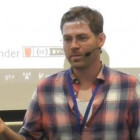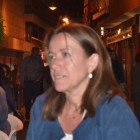Discovery Demos
Discovery Demos
Date Thursday, Dec 2 Time – Room: Gardenlounge
Discovery Demos allow you to test tools, next generation materials and pre-release free products for learning and training. Developers and creators will be present with laptops at standing tables, giving you the chance to see their work up close and interact on an informal, one-to-one basis.

Telmo Zarraonandia
Assistant Professor, Universidad Carlos III de Madrid , Spain
Telmo Zarraonandia is an associate professor at the Computer Science department of the University Carlos III of Madrid. He holds a degree and a PhD in Computer Science from the Universidad de Deusto and the Universidad Carlos III de Madrid, respectively. He is member of the Interactive Systems research group (DEI LAB www.dei.inf.uc3m.es). He has been doing research in the area of technologies for education for 15 years, with a special focus on exploring the use of immersive technologies and educational computer games for improving learning. He has more than 60 publications and participated in several research projects related with this field, and he is a coordinator of the work group on games and educative simulations of the Spanish Chapter of the IEEE Education Society.

André Dietrich
Researcher, Freiberg University of Mining and Technology, Germany
Originally a robotics and embedded software developer now working as a researcher at the Technical University Bergakademie in Freiberg. The current research interests are language design, new web technologies and online education with focus on open educational resources.

Elisabeth Kaliva
Scientific Lead Digital Open Learning Lab, Köln International School of Design TH Köln, Germany
Elisabeth Kaliva is the scientific lead of the Digital Open Learning Lab (DOLL) at the Köln International School of Design (KISD) of TH Köln. She is responsible for the research, conception and implementation of blended and seamless learning scenarios within the open source Social Learning Environment Spaces, which she co-developed. She is also the expert project leader in the university-wide implementation of Spaces at TH Köln. Furthermore she has a lectureship at the Learning Lab of the University Duisburg-Essen.
After her diploma in computer science and her master's degree in Educational Media at the University of Duisburg-Essen, Elisabeth Kaliva received her doctorate from Prof. Dr. Michael Kerres. Her dissertation examines the didactic implications of digital project-based learning scenarios. Elisabeth Kaliva has many years of experience in design education and social learning. Her research focuses on how digital innovations support and change social learning in higher education.
Links
Moderator

Rosa Garcia Calero
Programme Director, eLearning Africa, Spain
Rosa García Calero works as independent consultant in the field of education and ICTs. Starting as the International Relationship Manager in the Spanish Association of Educational Centres (CECE), she worked on building European and international networks and managing EU projects in the field of education and ICTs. She became Vice-President of EFVET (European Forum of Vocational Education and Training) and was also a member of the council of various other European Associations directly linked with education. She has managed different EU projects and, as an evaluator and reviewer of the European Commission, has focused on projects related to innovation and ICT practices for education and training. Rosa is highly committed to the future of education worldwide and in Africa in particular. In 2010, Rosa started working for the eLearning Africa conference, and in 2017 she became its Programme Director.
Links
https://www.linkedin.com/in/rosa-garcia…
iLikeIT2 - A New Way of Collaboration with Educational Technology
This demonstration will show an early prototype of a new collaborative software being developed through en Erasmus+-project.
The software, iLikeIt2, will be a variation of the traditional group work, where anonymity and written language will be emphasized more than physical contact and verbal expressions.
The finalied software can be used in both online and in-class settings, and also outside the educational system, as a voting tool.
In this demonstration participants will be able to attend a scenario both as students and as teachers, and test cases developed by the consortium.Participants will interact with each other, in a friendly and fun way, and experience how students learn from peers in learning situation. Thus, they will better understand how to apply question-based learning to a group, and benefit mutually from each others' experiences through discussions.
Outcomes:
- How to apply response technology both in-class and online
- How to utilise benefits of collaborative learning in your student group
- Enhance the effects of new and innovative EdTech in your institution
Agile, Competence-based Learning with User-co-created, Expandable Social Learning Environments, Elisabeth Kaliva
To make higher education more resilient, the focus should be on competence-oriented scenarios where students can take an active role and design their learning and collaboration. For the associated requirements, there is still a lack of user-friendly digital solutions. Therefore, the Köln International School of Design created the Social Learning Environment Spaces. In this Discovery Demo you will gain an insight into Spaces and discuss the possibilities as well as the impossibilities of its use.
Outcomes:
- The participants will learn about active learning scenarios in SLEs and factors for the successful use
- They will will learn the functions of Social Learning Environments (SLEs)
- They will discuss the benefits and challenges of SLEs also for their own context
Shiny New e-Learning Platforms: Great for Business, a Dead-end for Online Education?, André Dietrich
Do centralised platforms really support the distribution of knowledge and might fancy but restrictive educator interfaces actually be a threat to creativity? As an alternative we developed LiaScript, an extendable language for creating interactive online courses. Content can be created, edited, stored everywhere and shared freely. It even works offline, no back-end required. You will learn how to create quizzes with brackets, how to articulate and create animations with braces, and much more.
Learning outcomes:
- What are the problems of centralized platforms
- How can online education work on a decentralized web and infrastructure...
- How to use LiaScript to create open educational resources (OER)
Immersive Mixed Realities Technologies for Learning, Telmo Zarraonandia
This Discovery Demo session presents two educational tools developed to exploit the potential of immersive mixed technologies in an educational context: My-CHIC AR Farm is an educational Augmented Reality game for the Microsoft Hololens, and CHIC-Bubbles an immersive Virtual Reality visualization for the Oculus Quest headset. The systems are intended to be used by young students to learn about gene editing in the context of new plan breeding techniques.
Outcomes:
The participants will have the opportunity to have a first-hand experience with state or the art AR and VR devices and educational applications designed for them to better understand the potential of these novel technologies in the context of education.